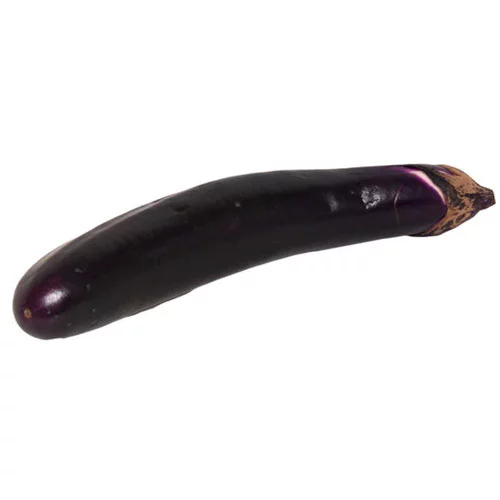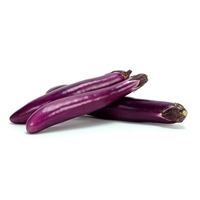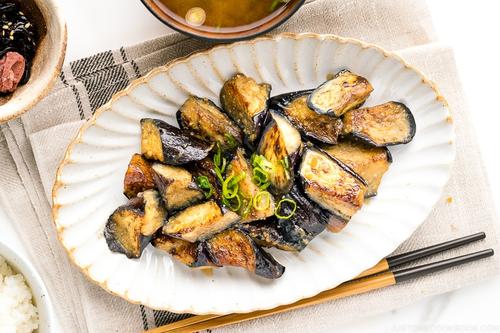MAIN DISHES
SALADS
SIDE DISHES
Japanese Eggplants
Japanese eggplants, also known as Nasu, are a variety of eggplant popular in Asian cuisine. Compared to the more familiar Western or Globe eggplant, these slender, elongated eggplants are known for their delicate flavor, thin skin, and fewer seeds. They are usually dark purple in color, approximately 8 inches long, and have a slightly curved shape.
These versatile eggplants can be used in numerous dishes, from stir-fries and grilled preparations to traditional Japanese recipes such as miso-glazed nasu dengaku. Their tender flesh absorbs flavors exceptionally well, making them an excellent choice for home cooks looking to explore the diverse flavors of Asian cuisine.
83%
CARBS
0%
FAT
17%
PROTEIN
46 Japanese Eggplants Products
Used In 6 Recipes
Japanese Eggplants Are Frequently Used With
Japanese Eggplants FAQ
Japanese eggplants often bring confusion among home cooks due to their different look, texture, and taste as compared to standard globe eggplants. Even though they appear distinct, their cooking principles remain similar. Some of the common pitfalls include overcooking them which leads to mushy and bitter eggplants, and under-seasoning or not seasoning them properly. Due to their ability to absorb flavors, choosing the right spices, sauces, and oils is essential for a delicious outcome. A good hack is to salt them first to bring out the moisture and bitterness before cooking, and remember, keeping the skin on helps them hold their shape better during cooking. Little known is their use in baking, they can be used in cakes and other desserts for an interesting twist on traditional recipes.
How to remove bitterness from Japanese eggplants?
Should I peel Japanese eggplant before cooking?
How do I know if a Japanese eggplant is ripe?
Can Japanese eggplants be eaten raw?
Is it necessary to salt Japanese eggplants before cooking?
Why are my Japanese eggplants bitter?
How can I use Japanese eggplants in recipes?
How to cook Japanese eggplant?
What's the difference between Japanese eggplant and regular eggplant?
Can you substitute regular eggplant for Japanese eggplant?
Expiration & Storage Tips
When does japanese eggplants expire?
An unopened Japanese eggplant can last up to a week at room temperature. If stored in the refrigerator, it can extend its freshness to about 2 weeks. However, once cut open, Japanese eggplants should be used within a day or two as they oxidize and start to lose their flavor. Freezing is not recommended as it can significantly affect the texture and taste of these eggplants.
How do you tell if japanese eggplants is bad?
When a Japanese eggplant has gone bad, it becomes soft, discolored and may develop brown spots. The surface might become wrinkly and the interior can become spongy. Bad odor is also a clear sign that it's time to toss out the eggplant. If you cut into the eggplant and notice the seeds inside are already brown, that's another indicator that it's no longer fresh.
Tips for storing japanese eggplants to extend shelf life
• Store the Japanese eggplants in a cool, dry place and not in direct sunlight.
• If not using immediately, you can also store them in the refrigerator. Simply put them in a plastic bag with a few holes for ventilation, and do not wash them until you are ready to use.
• To maintain freshness, wrap the cut open part of the eggplant in plastic wrap before storing it in the fridge.
• Japanese eggplants are sensitive to both heat and cold, so avoid storing them below 50°F (10°C) or in a hot place.
EXPIRES WITHIN
2 - 4
WEEKS
Health Info
Macros
7g
CARBS
0g
FAT
1g
PROTEIN
Allowed on these diets
LOW FAT
HIGH CALCIUM
VEGETARIAN
KETO
PALEO
WHOLE 30
MEDITERRANEAN
LOW CARB
VEGAN
LACTOSE FREE
GLUTEN FREE




































